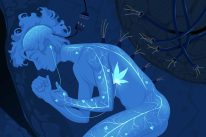
“When you learn to accept instead of expect, you’ll have fewer disappointments.” ~Unknown
A few months back, I was having drinks with a friend from university for the first time in a while. I sat across from her, smiling and laughing, almost in awe that we were here—here, not as in at this particular restaurant patio, but here, as in, in this moment that felt so free and so light, unbound by who we used to be.
During our first couple years of university, we were best friends, always hanging out, living together, supporting each other, swapping secrets, and creating unforgettable memories. And then over time, things changed.
Throughout university, we had found our own niches, our own interests, our own passions, and as we explored who we were and who we wanted to be, our friendship fell by the wayside.
In our last months of living together, our friendship created a lot of suffering for me. I constantly felt this weight between us, this heaviness that came from pretending that we were still the same as we were in the beginning, this heaviness of a friendship that wasn’t what it used to be.
Through my yoga practice, I found the tools I needed to free our relationship from this suffering, by shining a light on the truth and choosing something different.
So how do we find this freedom in our relationships?
1. Accept the relationship as it is.
The first step to changing anything is always to see it as it really is. We often create suffering in our relationships when reality doesn’t match the ideal in our head. We end up trying to force our relationships to be what we think they should be, based on the past or a fantasy, rather than accepting how they actually are in the present.
For me, this meant facing the truth that our friendship wasn’t as close as it once was and we were no longer the people we used to be. Until I accepted this truth, I suffered.
When we have the courage to face the truth—when we accept and interact with reality instead of clinging to how we want it to be—the pressure on the relationship automatically starts to lift.
And sometimes when the pressure lifts, relationships naturally get closer and stronger.
2. Challenge your faulty beliefs.
Throughout my confrontation with truth, I unearthed different thoughts that I’d had about our relationship. In particular, I became aware of this mantra that I had been repeating in my head: “I don’t belong.”
This belief was like an infection, poisoning my mind and tainting how I saw our friendship, before any interaction even took place. That story created and contributed to the heaviness that lay between us.
When relationships change, we often think it’s something we did. We blame ourselves, we think we did something wrong, or that we just are wrong. We might start telling ourselves things like, “I’m not good enough,” “There’s something wrong with me,” or even “It’s all my fault.”
We internalize something that is beyond our control, something that is often a natural experience as people grow and develop in their own ways.
As I grappled with the mantra I’d taken on, I realized that it didn’t just exist in this one single relationship; it went much deeper than that and affected how I saw and therefore how I interacted in other relationships.
I could see how this same thought had led to me feeling like an outsider in other relationships too. The thought was like a wall that kept me at arm’s length from everyone around me, while at the same time, there I was, wishing it were different.
Once I realized and accepted the truth, I could start to choose something different. I started to challenge that belief by reinforcing the opposite, “I belong here.”
When I spent time with her and other friends, I reminded myself that I was a part of this group. Whenever I questioned whether or not I belonged with any group, I reminded myself that I did. The more I did this, the stronger the new mantra got and the quieter the old one became.
3. Practice a new way and let go of expectations.
When we know the truth about our relationship, and we acknowledge our part in creating the suffering, we can start to practice something different.
We have to override the way we used to do things, or the thoughts we used to tell ourselves that led us to suffering, and consciously choose a different path. What this practice looks like depends on what truths you uncover.
For me, I asked my friend if she wanted to get together and catch up. Having recognized that I’d formed this idea that I didn’t belong and that our friendship was broken, I consciously set an intention to not compare our evening with how things used to be, and to let go of any expectations of how it should be. In essence, I wiped the slate clean, leaving myself open to however it turned out.
When we let go of how we think things should be and allow them to just be, we can interact with what’s really there. If we don’t set an ideal, there is no story to compare reality to. There is only reality.
As I sat across from her that day, I was no longer tethered to the past mantras or the disillusioned expectations of how things used to be. There was only the present moment, however it was going to be.
I wasn’t sure what would become of our friendship. We had spent so much time under the heaviness that I didn’t know what would be there when we took it away. I didn’t know if there would be anything left. All I knew was that I didn’t want this friendship to create anymore suffering; we both deserved to be free. I wanted our relationship to be free to be whatever it was now.
When our relationships create suffering, it often isn’t the relationship that has to change; it is how we see the relationship and how we interact with it.
Freeing our relationship from expectations brought back the lightness that I had missed so much, that I had fought for so long to get back.
In some ways, it felt like it used to, only different because the specifics of our friendship didn’t change at all. We aren’t as close, we don’t get together that often, and we aren’t as involved in each other’s lives. The only thing that changed was how we saw it. And because of that, when we do get together, our friendship is fun, supportive, and freeing again.
Have the courage to seek the truth within yourself and acknowledge the effect of your thoughts, beliefs, and actions with compassion and without judgment. Only then can you choose a different way, a freer way.
Sitting across from her that day, there was freedom. I could feel it. And I think she could feel it too.
About Kiara Elliott
Kiara Elliott is a Pranalife Certified Yoga Teacher and aspiring workplace wellness health promoter. Her mat is her practice ground for making changes in her life. She loves sharing her passion for yoga and wellness with others so they can reach their fullest potential. She also loves reading and having coffee with friends. Check her out on Facebook here or Instagram (elliott_kiara).













 Though I run this site, it is not mine. It's ours. It's not about me. It's about us. Your stories and your wisdom are just as meaningful as mine.
Though I run this site, it is not mine. It's ours. It's not about me. It's about us. Your stories and your wisdom are just as meaningful as mine.